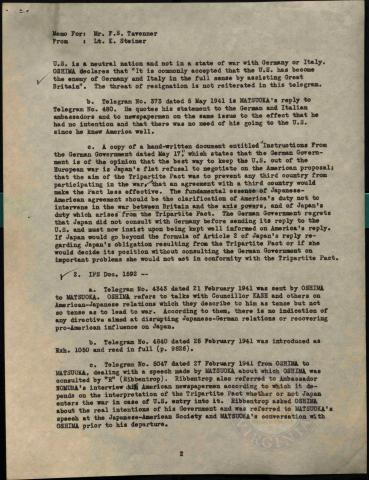
Page 2
| Parent | Examination of Documents Results November 6, 1947 |
|---|---|
| Date | 6 November 1947 |
| Language | English |
| Collection | Tavenner Papers & IMTFE Official Records |
| Box | Box 6 |
| Folder | General Reports and Memoranda from November 1947 |
| Repository | University of Virginia Law Library |
Memo For: Mr. F.S. Tavenner
From: Lt. K. Steiner
U.S. is a neutral nation and not in a state of war with Germany or Italy. OSHIMA declares that "It is commonly accepted that the U.S. has become the enemy of Germany and Italy in the full sense by assisting Great Britain"• The threat of resignation is not reiterated in this telegram.
b. Telegram No. 373 dated 5 May 1941 is MATSUOIA's reply to Telegram No. 480. He quotes his statement to the German and Italian ambassadors and to newspapermen on the same issue to the effect that he had no intention and that there was no need of his going to the U.S. since he knew America well.
c. A copy of a hand-written document entitled "Instructions From the German Government dated May 17," which states that the German Govern¬ment is of the opinion that the best way to keep the U.S. out of the European war is Japan's flat refusal to negotiate on the American proposals that the aim of the Tripartite Pact was to prevent any third country from participating in the war <insert>and</insert> that an agreement with a third country would make the Pact less effective. The fundamental essence of Japanese-American agreement should be the clarification of America's duty not to intervene in the war between Britain and the axis powers, and of Japan's duty which arises from the Tripartite Pact. The German Government regrets that Japan did not consult with Germany before sending its reply to the U.S. and must now insist upon being kept well informed on America's reply. If Japan would go beyond the formula of Article 2 of Japan's reply re¬garding Japan's obligation resulting from the Tripartite Pact or if she would decide its position without consulting the German Government on important problems she would not act in conformity with the Tripartite Pact.
2. IPS Doc. 1592 —
a. Telegram No. 4343 dated 21 February 1941 was sent by OSHIMA to MATSUOKA. OSHIMA refers to talks with Councillor KASE and others on American-Japanese relations which they describe to him as tense but not so tense as to lead to war. According to them, there is no indication of any directive aimed at disrupting Japanese-German relations or recovering pro-American influence on Japan.
b. Telegram No. 4840 dated 26 February 1941 was introduced as Exh. 1050 and read in full (p. 9826).
c. Telegram No. 5047 dated 27 February 1941 from OSHIMA to MATSUOKA dealing with a speech made by MATSUOKA about which OSHIMA was consulted by WR" (Ribbentrop). Ribbentrop also referred to Ambassador NOMURA's interview American newspapermen according to which it de¬pends on the interpretation of the Tripartite Pact whether or not Japan enters the war in case of U.S. entry into it. Ribbentrop asked OSHIMA about the real intentions of his Government and was referred to MATSUOKA's speech at the Japanese-American Society and MATSUOKA's conversation with OSHIMA prior to his departure.
